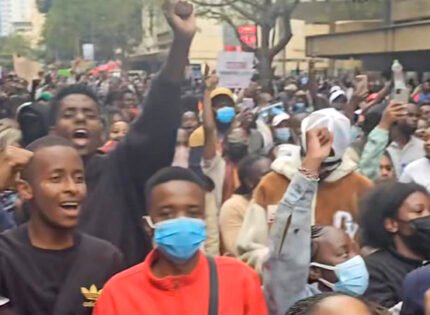South Africans losing hope in their cornerstone, the ANC.

For the past 25 years, democracy in South Africa has been synonymous with the African National Congress (ANC).
The ANC came to power after bringing an end to white apartheid rule in 1994, under the leadership of the late Nelson Mandela. And in every election since, the ANC has always managed to win the majority vote.
However, the past few years have seen the ANC lose popularity amongst its Black majority core. The recent elections on May 8, saw only about half of the total eligible population bother to register as voters and only half of them actually voted.
Scandals, corruption, mismanagement, a decline in economic growth, collapsing public services, soaring unemployment and high levels of violent crime are some of the reasons why the ANC’s support is dwindling. There’s also growing anger over the party’s failure to hold its officials to account following graft investigations.
The shenanigans of former President Jacob Zuma played a role in alienating many South Africans. The former president faces 16 charges of fraud, corruption and money laundering stemming from hundreds of payments made to him in relation to a 1990s arms procurement deal. He has also been accused of allowing members of the Gupta family, who were in business with his son, to influence government contracts and cabinet appointments. Both he and his son deny any wrongdoing.
On the other hand, the Economic Freedom Fighters (EFF) under Julius Malema is gaining traction among young, disgruntled Black South Africans. It started when a group of ambitious, savvy leaders of the ANC’s youth league, headed by Julius Malema, were kicked out of the ruling party in 2013 and formed their own political home.
The EFF are positioning themselves as the better alternative to the bureaucratic ANC. Their rapid rise is concerning their detractors because it signifies a paradigm shift among the citizenry.
ANC officials argue they are still struggling to overcome decades of deliberate impoverishment of most of the population by post-apartheid white supremacist apartheid rulers. However, newly elected President Cyrille Ramaphosa was quick to defend the decline in popularity and remains steadfast in the belief that the ANC will be vindicated.
“Corruption got in the way, patronage got into the way and not focusing on the needs of our people got in the way… Now we are owning up to that. We are saying we are going to correct the bad ways of the past,” Ramaphosa is quoted as saying.
OH SEMENYA!

Here we are in the year of our Lord 2019, and women’s bodies are still under scrutiny. The “others” want to regulate the woman’s body, because it doesn’t look like the “norm.”
The same could be said for South African athlete Caster Semenya; her body has been the subject of ridicule and speculation for almost a decade.
In 2009, she nabbed the World Championship title, and the IAAF (International Association of Athletics Federations) began to investigate if she was “intersex (people with developmental conditions affecting the genitalia and gonads). To protect her privacy, the findings are unpublished.
However, on May 1, the Court of Arbitration for Sport, ruled that she was among the group of athletes with syndromes known as 46, (XY), which means that a person with a male (Y) chromosome and high testosterone does not develop male genitalia. Therefore, the court ruled that if she wants to participate in international athletics she would have to take medication to reduce her testosterone.
Semenya was quoted as saying that, “the regulations are unfair and I should be allowed to run naturally the way I was born.”
And why shouldn’t she?














